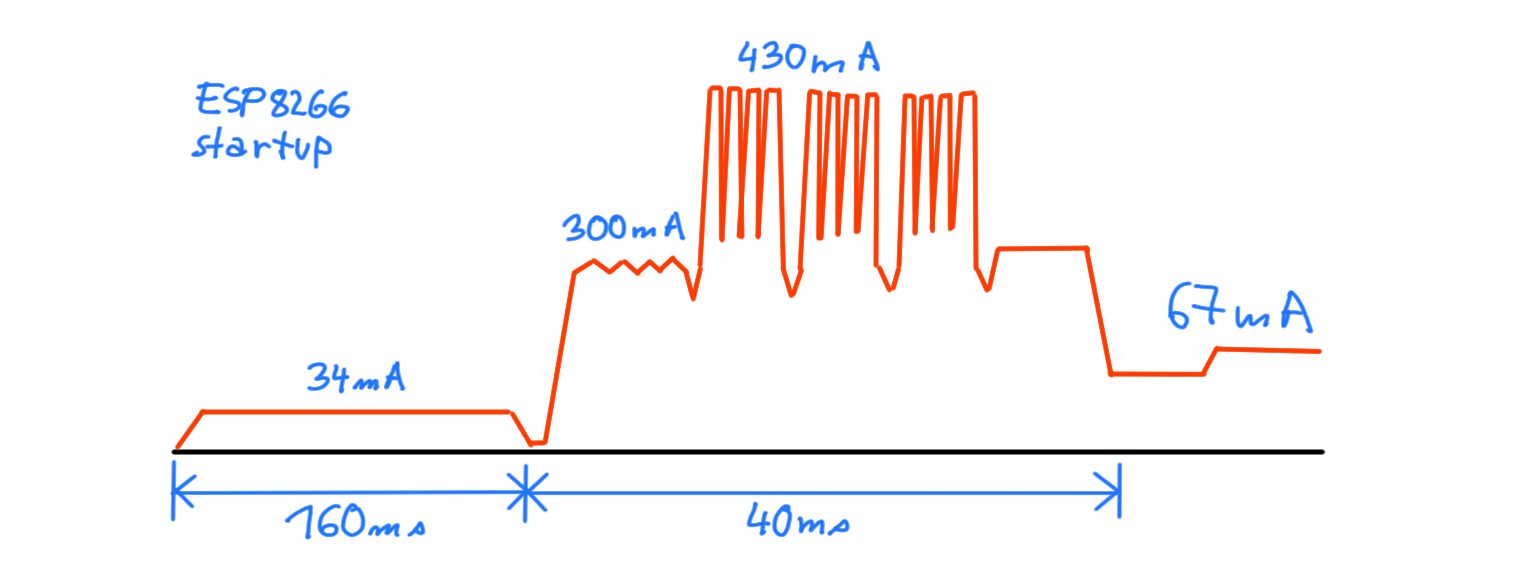Reboot cause: WEMOS D1 (clone) voltage regulator ??
Posted: 05 Apr 2019, 17:58
I highly suspect the WEMOS D1 (clone) voltage regulator to be part of the reboot problem.
This low-dropout or LDO regulator has SMD marking code 4A2D which leads to the Torex XC6204. From this LDO there are 150mA and 300 mA versions.
The 300mA is the XC6204 E to H type. The SMD marking code 4A2D gives no clue on a 150 or 300mA version.
The original WEMOS D1 documentation shows a ME6211 LDO with 500mA current.
A search on internet shows ESP8266 current peaks of 200 up-to 430mA.
So the regulator of the WEMOS D1 clone seems to be under-engineered.
I have made 6 previous projects with NODEMCU boards running v2.0.0-dev7 up-to v2.0.0-dev11 with 8-12 DS18B20, which are extreme stable (1 automatic reboot in 49 days), but never tested these version on WEMOS D1.
The NODEMCU boards do have a LM1117 800mA regulator.
So I flashed v2.0.0-dev7 and v2.0.0-dev11 on WEMOS D1 clones.
Configurations with 2# DS18B20 (from the 3.3V from WEMOS D1) and a optional a Pulse Counter task connected to a frequency generator (see note) with 1 - 80 Hz (on 5V via level shifter)
Reporting temperature and Counter frequency every 30 sec. to Domoticz.
Reboots are send to a Domoticz switch for logging, via a rule:
The result:
Even the rock-solid v2.0.0-dev7 and v2.0.0-dev11 reboots on WEMOS D1 with only 2# DS18B20!!
With pulse counter .. more reboots. Higher frequency ... more reboots.
The reboot soup:
- WEMOS clone with under-engineered 3.3V regulator for ESP8266 chip
- DS18B20 connected to under-engineered 3.3V regulator
- DS18B20 address and resolution problems
- A lot of interrupts
- A lot of WiFi transmissions
- 802.11 B/G/N mode (B more power-hungry than N ??? ...see https://www.itead.cc/wiki/ESP8266_Serial_WIFI_Module)
Breadboard assumption validation:
I disconnected the 5V connection and used a 3.3V regulator LM1117T-3.3 with 800mA specification. Thus by-passing the on-board regulator.
 This unit with v2.0.0-dev7 is now running for 17 hour with a 60Hz Counter task. ... without reboots !!
This unit with v2.0.0-dev7 is now running for 17 hour with a 60Hz Counter task. ... without reboots !! 
Next step will be a 3.3V modification of some of my WIP units to test v2.0.0-dev7 and v2.0.0-dev11
See: viewtopic.php?f=2&t=5955&p=32473#p32473
Further tests will be with recent releases.
Will keep you informed,
Domosapiens
Note: frequency generator: €1.73 ,highly recommended:
https://nl.aliexpress.com/item/Signal-G ... Title=true
This low-dropout or LDO regulator has SMD marking code 4A2D which leads to the Torex XC6204. From this LDO there are 150mA and 300 mA versions.
The 300mA is the XC6204 E to H type. The SMD marking code 4A2D gives no clue on a 150 or 300mA version.
The original WEMOS D1 documentation shows a ME6211 LDO with 500mA current.
A search on internet shows ESP8266 current peaks of 200 up-to 430mA.
So the regulator of the WEMOS D1 clone seems to be under-engineered.
I have made 6 previous projects with NODEMCU boards running v2.0.0-dev7 up-to v2.0.0-dev11 with 8-12 DS18B20, which are extreme stable (1 automatic reboot in 49 days), but never tested these version on WEMOS D1.
The NODEMCU boards do have a LM1117 800mA regulator.
So I flashed v2.0.0-dev7 and v2.0.0-dev11 on WEMOS D1 clones.
Configurations with 2# DS18B20 (from the 3.3V from WEMOS D1) and a optional a Pulse Counter task connected to a frequency generator (see note) with 1 - 80 Hz (on 5V via level shifter)
Reporting temperature and Counter frequency every 30 sec. to Domoticz.
Reboots are send to a Domoticz switch for logging, via a rule:
Code: Select all
On System#Boot do
timerset,3,10 //wait for wifi connect
Endon
On Rules#Timer=3 do
SendToHTTP 192.168.1.7,8080,/json.htm?type=command¶m=switchlight&idx=174&switchcmd=On
SendToHTTP 192.168.1.7,8080,/json.htm?type=command¶m=switchlight&idx=174&switchcmd=Off
Endon
Even the rock-solid v2.0.0-dev7 and v2.0.0-dev11 reboots on WEMOS D1 with only 2# DS18B20!!
With pulse counter .. more reboots. Higher frequency ... more reboots.
The reboot soup:
- WEMOS clone with under-engineered 3.3V regulator for ESP8266 chip
- DS18B20 connected to under-engineered 3.3V regulator
- DS18B20 address and resolution problems
- A lot of interrupts
- A lot of WiFi transmissions
- 802.11 B/G/N mode (B more power-hungry than N ??? ...see https://www.itead.cc/wiki/ESP8266_Serial_WIFI_Module)
Breadboard assumption validation:
I disconnected the 5V connection and used a 3.3V regulator LM1117T-3.3 with 800mA specification. Thus by-passing the on-board regulator.
Next step will be a 3.3V modification of some of my WIP units to test v2.0.0-dev7 and v2.0.0-dev11
See: viewtopic.php?f=2&t=5955&p=32473#p32473
Further tests will be with recent releases.
Will keep you informed,
Domosapiens
Note: frequency generator: €1.73 ,highly recommended:
https://nl.aliexpress.com/item/Signal-G ... Title=true
